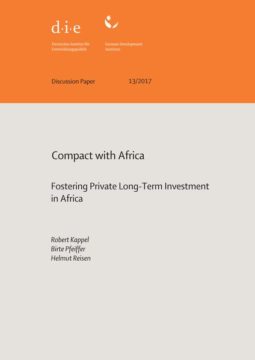With its “Compact with Africa”, the German G20 Presidency intends to encourage private institutional and corporate investment, together with the African partners. The objective is to boost growth and jobs, promote inclusion and give people economic perspectives at home so that they do not have to leave their home country to seek subsistence elsewhere. Stimulating private sustainable investment in Africa has been a longstanding G20 policy target.
Total assets managed by long-term institutional investors are projected to reach $100 trillion by 2020, up from $62 trillion just eight years earlier. To fill Africa’s annual infrastructure funding gap of $50 billion, one percent of new institutional investment by pension funds, life insurance companies and sovereign wealth funds would need to be invested in Africa’s infrastructure every year. Yet, despite the longstanding policy focus of G7/20 leaders, private long-term investment in Africa’s infrastructure has remained deficient. Private finance still plays a minority role in funding Africa’s infrastructure. Regulatory supply-side barriers for investors and low-income Africa host barriers are identified as root causes. To help improve the situation, appropriate dialogue partners not envisaged so far are identified, especially prudential regulators. As for low-income Africa, the paper recommends realism: Most African countries are at the first two steps of the Infrastructure Funding Escalator, where public investment and concessionary aid remain the major funding sources.
FDI inflows produce important effects which go beyond spillovers to domestic firms. But while some middle-income African countries have managed to enter global value chains, it is shown that the transfers of technology and spillover effects are still limited, especially in low-income Africa; a systematic trend can hardly be identified. In order to drive structural transformation in Africa, some policy prerequisites are seen as key: apart from political and macroeconomic stability, improved transport systems and energy access to generate agglomeration benefits and industrial clusters. Regional economic integration is essential for Africa to realize its full growth potential. The paper suggests crucial elements of a favourable investment climate (such as access to finance and imported inputs, enforcement of contracts, reliable regulatory standards, improved infra¬structure) for local firms and foreign investors, to raise the potential of upgrading in global value chains through tax incentives and local content requirements, and the formation of industrial clusters.
- Veröffentlicht am Donnerstag 19. Dezember 2024 von Deutsches Institut f. Entwicklungspolitik
- ISBN: 9783960210351
- 57 Seiten
- Genre: Gesellschaft, Politik, Sachbücher, Wirtschaft
